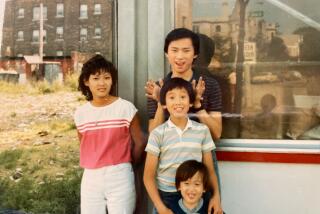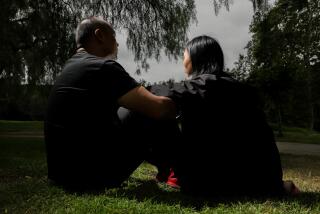A Trip to China That Stopped Being a Trip : RIDING THE IRON ROOSTER By Train Through China<i> by Paul Theroux (G.P. Putnam’s Sons: $21.95; 477 pp.) </i>
- Share via
There will probably be no better portrait of how China looks and feels to a foreigner in the 1980s than Paul Theroux’s “Riding the Iron Rooster.” At long last, a talented writer has captured in one sprawling, extraordinary book all the craziness, the contradictions, the mixture of hope and despair, the wild swings between control and utter chaos which can be found in China today. Nothing else written to date describes so well the nation which Westerners discover these days when they live in China, or when they venture to travel outside the well-worn tourist meccas of Beijing, Shanghai, Canton and Xian.
Although he has published several novels, Theroux is best known as one of America’s leading travel writers. His reputation is based largely on the popularity of “The Great Railway Bazaar,” a book in which he chronicled his sojourns along some of the leading train routes in the world. In that earlier work, Theroux, oddly enough, seemed to focus more on the train travel than he did on the countries he was traversing and the people he met.
“Riding the Iron Rooster” surpasses Theroux’s previous train books. His general approach for the new book is not unlike that of previous ones: over a period of a year or so, in 1986-87, Theroux rode the rails through China, stopping off for days or weeks at a time to visit its major cities and provinces. Yet the end result is something different from the “Railway Bazaar”--not so much a travel book as an epic account of China itself.
Theroux learned quickly that China’s vaunted openness is, to say the least, not without limits. During the early parts of the trip he found himself in the clutches of the Ministry of Railways, one of China’s most intractable and incorrigible bureaucracies, which assigned a hapless official named Fang to accompany Theroux on the trains and trail along behind him whenever he disembarked. Theroux finally got rid of his escort by wearing him down. “I have never taken so many trains at once,” moaned Fang. “I have never slept on so many trains. Trains, trains.” In one of the zaniest episodes in the book, this veteran railway bureaucrat pleaded with Theroux to switch to airplanes.
The author has a wonderful eye for detail. Many others have described the new hustlers on the streets of Chinese cities, but Theroux summarizes the phenomenon in a single anecdote: “A man tried to sell me a trophy awarded to the winner of a schoolboy javelin competition in 1933 at a Japanese high school. ‘Genuine silver,’ he whispered. ‘Qing Dynasty.’ ”
The book is full of Theroux’s mordant, epigrammatic reflections on Chinese customs, habits and scenery. Granted an interview with a Chinese official, he observes: “There is something in the very nature of Chinese authority that makes anyone who asks questions seem childishly naive and credulous, not to say dangerous.” Trying to use the phone, he finds, “When you got through, you often heard five other voices--or more--holding simultaneous conversations. A Chinese phone was like Chinese life: It was full of other people, close together, trying to do exactly what you were trying to do.” China’s new hotels “smelled of fish glue and failure,” he writes; and as for their decor, “the only variables were the size of the pool, the dimensions of the tortoise, the depth of the algae, and was the Great Wall painted or embroidered?” Upon seeing too much of urban China, Theroux concludes: “The words ‘a Chinese city’ had acquired a peculiar horror for me, like ‘Russian toilet,’ or ‘Turkish prison,’ or ‘journalist’s ethics.’ ”
When it comes to Chinese politics, Theroux slips badly. He writes of the Cultural Revolution with all the depth of a comic book, as if there were only evil young Red Guards and tyrannized Chinese intellectuals, with no power struggle at the top ranks of the Communist Party at the root of it all. Theroux’s perfunctory efforts to write about the student demonstrations and political upheavals which took place while he was in China are equally simplistic. He calls Peng Zhen, one of the old Communist Party leaders who at the beginning of 1987 unsuccessfully challenged the authority of Deng Xiaoping, a “dogmatic Maoist”; in fact, Peng was Mao’s very first target at the beginning of the Cultural Revolution.
In the end, Theroux succeeds because he learns to be utterly honest, both about China and with himself. “Travel writing is a minor form of autobiography,” he observes. At the outset, Theroux is not a particularly likable character. As he prepares to enter China, he seems overwhelmed with ennui and self-absorption; once, he even gratuitously calls the reader’s attention to his supposed fame as a writer. So, too, in the early stages of the book Theroux conceals as much as he tells us. He never explains why he chooses to enter China with a tour group. He never tells us when or how he learned Chinese. Midway through the book, a few months unaccountably vanish; it seems likely that Theroux has seized the opportunity to escape from Canton to the Western comfort of Hong Kong, but he doesn’t admit it.
But China is a humbling place, and the more time Theroux spent there, the more honest he became. At the very end of his journey, after a harrowing rail-and-car trip overland to Tibet, he confesses to the ultimate heresy. Paul Theroux, a man whose very name is associated with railways, confesses he might not really like trains very much. “I thought I liked railways until I saw Tibet, and then I realized that I liked wilderness much more,” he says. The cause of this personal discovery was China. “This Chinese trip was so long and it had claimed so much of me that it stopped being a trip,” writes Theroux. “It was another part of my life; and ending the travel was not a return but a kind of departure, which I regretted.”
So, too, “Riding the Iron Rooster” claimed so much of Theroux that he produced more than just a travel book. No recent visitor to China has written about it so well.
More to Read
Sign up for our Book Club newsletter
Get the latest news, events and more from the Los Angeles Times Book Club, and help us get L.A. reading and talking.
You may occasionally receive promotional content from the Los Angeles Times.










